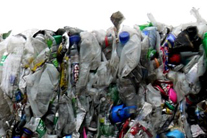Gasification & Pyrolysis the Answer for U.S. Waste Plastics?
 A new study showing has shown that emerging new technologies designed to convert waste into fuels or raw materials offer environmental benefits and cost savings over landfill disposal.
A new study showing has shown that emerging new technologies designed to convert waste into fuels or raw materials offer environmental benefits and cost savings over landfill disposal. The study - Environmental and Economic Analysis of Emerging Plastics Conversion Technologies - has been The American Chemistry Council’s (ACC) Plastics Division and conducted by RTI International - an independent, nonprofit institute that provides research, development, and technical services to government and commercial clients.
The research examined two types of advanced conversion technologies: gasification and pyrolysis.
According to the ACC, although both technologies are capable of processing a wide range of wastes, the study looked specifically at gasification technology that accepts all municipal solid waste (MSW), including non-recycled plastics; and pyrolysis that handles non-recycled plastics only.
In performing the study, RTI said that it conducted a search of the published literature on waste conversion technologies coupled with a survey of companies known and identified to be developing, or having deployed, waste conversion technologies.
When compared to landfill disposal, RTI found that gasification of MSW saves 6.5 to 13 million Btu per ton and 0.3 to 0.6 tons of carbon equivalent emissions per ton (1 ton = 907 kg).
Similarly, pyrolysis, which converts plastics to oil or gas, saves 1.8 to 3.6 million Btu per ton and 0.15 to 0.25 tons of carbon equivalent per ton over landfill disposal.
RTI identified 41 advanced conversion technology facilities that are under development or undergoing demonstration in North America that that will accept MSW or non-recycled plastics as feedstocks.
According to the study, due to their benefits - such as the potential to produce a range of energy, fuel, feedstocks, and chemicals, as well as waste diversion benefits - these waste conversion technologies are expected to become much more attractive in North America in the next five to ten years.
However, the study also found that plastics-to-oil pyrolysis technologies are generally closer to full scale commercialisation than MSW based technologies (typically gasification), in part because of the more consistent feedstock composition and supply for the former.
Key findings
The key drivers for conversion technologies identified by the research include the alternate costs for disposition of the waste (generally landfill costs), meeting waste diversion goals and targets, and developing alternative energy sources.
Significantly, the study showed that that in some regions waste conversion technologies are already able to produce fuel outputs at lower costs than landfill.
According to RTS, survey data indicates that the cost to process the waste is approximately $50 per ton (for pyrolysis and gasification technologies), and is generally related to the cost of electricity or fuel required to run the process. For comparison average U.S. costs for landfill disposal and recycling range from $30 to $75/ton depending on region.
“This study is the latest in a growing body of information showing that many of the things we’ve viewed as waste actually have tremendous potential as energy resources,” commented Steve Russell, vice president of Plastics for ACC.
“As a complement to a robust recycling infrastructure, conversion technologies offer environmental benefits and cost savings over traditional waste disposal processes,” he added.
However, the authors do also point direct comparisons of the costs and environmental benefits of gasification and pyrolysis technologies are not recommended due to differences in the energy value of the different feedstocks they use and differences in beneficial offsets.
Check out how Klean’s superior, commercial grade technology puts its competition in its place - These beneficial offsets are explained in further detail in the study.
You can return to the main Market News page, or press the Back button on your browser.

